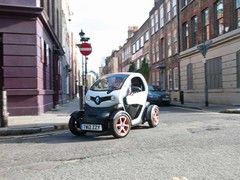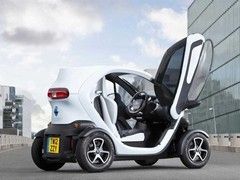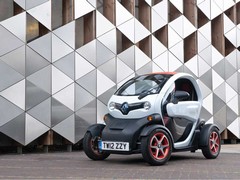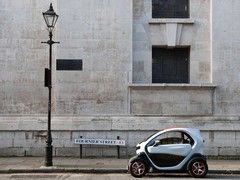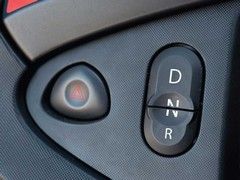Driven: Renault Twizy
Chris Harris goes electric. And doorless. In the middle of winter.
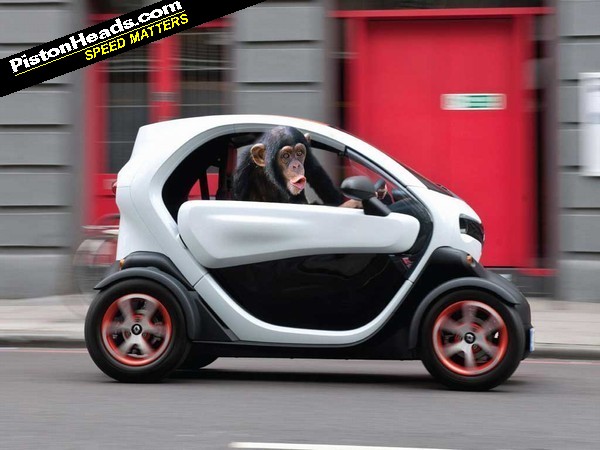
You would have to be very brave, or be able to guarantee that your journeys would always be shorter than Mo Farah's chosen distance, to rely on a Twizy as your only form of transportation.
It isn't really necessary to list the problems associated with driving a small, windowless electric car in the wettest December on record - bar the fact that on some days I simply couldn't face the potential drenching and even when some of the new auxiliary 'windows' arrived in the post from Renault UK.
The inevitability of it all
Electric power for the motor car is no longer spoken of a potential outcome, to many people it has become an inevitability. After three weeks using one, albeit a car designed for shorter journeys, I just can't see it myself. Within the M25, perhaps. But anywhere outside a major conurbation electric cars don't work. Actually, even inside large towns they don't work because the charging process requires you to park your car on the street and trust in the mutual decency of your fellow human beings not to tamper with the charging cable. Quite.
So, if you live in town, you either have to own a garage, or have a driveway to guarantee a tamper-free charging process. This means that electric cars are for the time being the preserve of rich people, which rather defeats the object of the exercise.
Loose wires
There appear to be two solutions to this: a mass implementation of inductive charging in all of our major cities - in other words pads hidden under the road surface that can charge your batteries wirelessly like those clever widgets for mobile phones. Or the Parisian solution, which is to have stations for swapping your spent batteries for fresh ones. The first would probably be the most expensive and disruptive infrastructure project the UK has undertaken since WW2, and is therefore unlikely to happen outside Westminster Village. The second actually strikes me as a great idea and re-imagines a time of Victorian coach houses - Pickwick and pals stopping for fresh horses. But again, it would cost billions.
But both require huge infrastructure change at a time when we cannot afford to maintain our road system or adequately develop our rail network to accommodate extra passenger volumes. Currently, there isn't a bean to spend on this stuff.
Billy no mates
Accordingly, the electric motorist in rural Britain feels especially lonely - like the character Will Smith plays in apocalyptic New York who can venture into the city by day, but must - absolutely must - return before nightfall. This isn't the Twizy's fault at all. There simply isn't any infrastructure to support such a vehicle There are no charging points - and what happens if you run out of charge on the way home because a landslide added 10 miles to the journey? You're stuffed.
However, there are very rewarding upsides to driving a vehicle that with two occupants and as many shopping bags as can be stuffed under your feet can sustain 51mph on the flat. The first is the delectable silence with which it pulls away from a standing start and then scoots to 20mph. Thereafter you have to deal with the chip-chip-chip of stones stuck in tyre treads and a whining noise that proved the researches working on The Cannonball Run nailed the future sound of electric motoring back in 1981.
Spark of pleasure
The Twizy rides on weeny 125-section tyres and its unassisted steering is rather enjoyable. Weather protection is good for the driver, with just enough wind flutter to let you know that this isn't a supermini. I like that. I also love planning potential overtakes in one of the UK's slowest cars, and after several attempts I managed to inch past an elderly soul in her Nissan Micra. The sense of jubilation was so pathetically written on my face that I don't want to embarrass myself any further describing it here. For the avoidance of doubt, on the public highway, the car will not oversteer.
The Twizy is a rolling metaphor for human reluctance to embrace change. Despite some of our actions, on the whole we are logical creatures and we won't consider profound changes to our lives unless a new solution proves itself so helpful that it supersedes an existing technology. Yes, the electric car is quieter and cleaner - albeit it in the sense that it pushes the pollution to a different place on the energy chain.
Suck squeeze bang blow
But at a time when car makers are squeezing freakish economy figures from the internal combustion engine and the English language is poised to welcome 'fracking' as the most popular technology-related word of 2013, electric cars present themselves in a moral, not a practical capacity.
Historically, we are not known for making global gestures of this nature. The Prius tapped into the zeitgeist, but as we all know, its eco-credentials are extremely questionable.
Renault sits at the hub of this process because it perfectly demonstrates both schools of thought. On the one hand Renault's leap into electric-only vehicles has been a sales disaster. People simply don't want them - Twizy included - in the numbers the French company had hoped. At the same time Renault-owned Dacia is busy pinching market share all over the world by offering the complete opposite: antiquated technology and low-tech internal combustion engines.
In some respects it looks like a clever overall strategy, but that assumes western nations will soon adopt the electric car as a utility device, not an anomaly for wealthy environmentalists. And that depends on state-funded infrastructure, an alien concept in Europe right now.
I would happily own a Twizy. I would use it to pop into town, zip to the pub and generally bimble about the place.
It is the perfect fifth car.
RENAULT TWIZY
Engine: electric motor, 6.1kWh lithium-ion battery pack
Transmission: 1-speed reduction gear
Power (hp): 17
Torque (lb ft): N/A
0-62mph: N/A
Top speed: 50mph (limited)
Weight: 474kg
Range: 60 miles (NEDC)
CO2: Depends how you view it...
Price: £6,990-£7,400 (basic RRP)
Gassing Station | General Gassing | Top of Page | What's New | My Stuff

